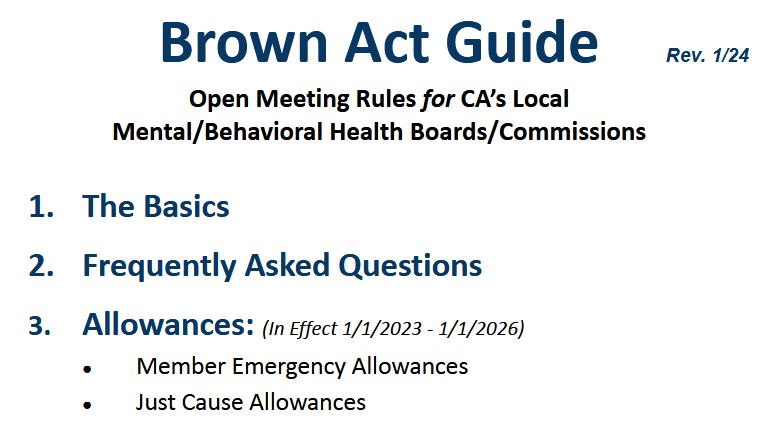The Brown Act
Basic RequirementsAgenda & Meeting Notification
Serial Meetings (Avoid contacts that constitute a quorum outside of publicly noticed meetings) Standing Committees (Brown Act requirements, just as with full board or commission) Teleconferences (Roll-call vote requirement) More Below
|
Brown Act Guide
|
Teleconferences
Public Emergency Allowances
|
Teleconferencing when not operating
|
Public Comment 54954.3.(a) Every agenda for regular meetings shall provide an opportunity for members of the public to directly address the legislative body on any item of interest to the public, before or during the legislative body’s consideration of the item, that is within the subject matter jurisdiction of the legislative body, provided that no action shall be taken on any item not appearing on the agenda unless the action is otherwise authorized by subdivision (b) of Section 54954.2. However, the agenda need not provide an opportunity for members of the public to address the legislative body on any item that has already been considered by a committee, composed exclusively of members of the legislative body, at a public meeting wherein all interested members of the public were afforded the opportunity to address the committee on the item, before or during the committee’s consideration of the item, unless the item has been substantially changed since the committee heard the item, as determined by the legislative body. Every notice for a special meeting shall provide an opportunity for members of the public to directly address the legislative body concerning any item that has been described in the notice for the meeting before or during consideration of that item.
(b) (1) The legislative body of a local agency may adopt reasonable regulations to ensure that the intent of subdivision (a) is carried out, including, but not limited to, regulations limiting the total amount of time allocated for public testimony on particular issues and for each individual speaker. (2) Notwithstanding paragraph (1), when the legislative body of a local agency limits time for public comment, the legislative body of a local agency shall provide at least twice the allotted time to a member of the public who utilizes a translator to ensure that non-English speakers receive the same opportunity to directly address the legislative body of a local agency. (3) Paragraph (2) shall not apply if the legislative body of a local agency utilizes simultaneous translation equipment in a manner that allows the legislative body of a local agency to hear the translated public testimony simultaneously. (c) The legislative body of a local agency shall not prohibit public criticism of the policies, procedures, programs, or services of the agency, or of the acts or omissions of the legislative body. Nothing in this subdivision shall confer any privilege or protection for expression beyond that otherwise provided by law. |
Updates to the Brown ActAllowances for Members due to "Just Cause" or "Emergency" [When not operating in a public emergency.] (In effect January 1, 2023 - January 1, 2026): A local board/commission member may participate remotely without posting their physical location on the agenda under certain circumstances and with certain requirements. [See Brown Act Guide, Page 4 for circumstances and requirements.]
Public Emergency Allowances Exemptions from in-person requirements under certain conditions and with certain requirements. Details: GOV Section 54953 e. On-Line Posting Writings distributed to the majority of a local legislative body less than 72 hours before a meeting can be posted online if physical copies are made available for public inspection at the beginning of the next regular business hours at a public office or designated location (provided that the next regular business hours of the local agency commence at least 24 hours before that meeting.) Teleconferencing (July 2017) All votes taken during a teleconferenced meeting shall be by roll call. AB428 Individual Votes should be recorded (2014) Gov't Code § 54953(c)(2) requires the "legislative body of a local agency [to] publicly report any action taken and the vote or abstention on that action of each member present for the action." Agendas On-line (July 2017) At least 72 hours before a general or standing committee meeting (and 24 hours before a special meeting), the legislative body of the local agency, or its designee, shall post an agenda containing a brief general description of each item of business to be transacted or discussed at the meeting, including items to be discussed in closed session. A brief general description of an item generally need not exceed 20 words. The agenda shall specify the time and location of the regular meeting and shall be posted in a location that is freely accessible to members of the public and on the local agency’s Internet Web site, if the local agency has one. If requested, the agenda shall be made available in appropriate alternative formats to persons with a disability, as required by Section 202 of the Americans with Disabilities Act of 1990 (42 U.S.C. Sec. 12132), and the federal rules and regulations adopted in implementation thereof. [Guidance on Web Accessibility and the ADA] The agenda shall include information regarding how, to whom, and when a request for disability-related modification or accommodation, including auxiliary aids or services, may be made by a person with a disability who requires a modification or accommodation in order to participate in the public meeting. AB2257 (effective on and after January 1, 2019). |

